Traffic
Albums reviewed on this page: Dear Mr.
Fantasy, Traffic, Last Exit,
Alone Together, John Barleycorn
Must Die, Welcome to the Canteen,
The
Low Spark of High Heeled Boys, Oh How We
Danced, Shoot Out at the Fantasy Factory,
When the Eagle Flies.
At their peak, Traffic were a very good band, not a
great one. In their early days they were significant, combining
the soul that Steve Winwood brought from the Spencer Davis Group with
almost everything else. The interesting fact is that for the
first four albums they didn't have a bassist, with Winwood and Mason
splitting the task. Then came the inevitable breakup after
their strongest album together (Traffic), with Mason getting
fired, and then Winwood running off to join Blind Faith and Ginger
Baker's messy ensembles. Their first album back together
(without Mason) was a great folk turn (John Barleycorn Must Die),
but was followed by a long string of flat progressive affairs where
their sound became increasingly stultified. The core members -
Winwood, Wood and Capaldi were all pretty solid players, even if
their inspiration deserted them later on. Their sound is
generally a mix of soul and folk, with Winwood (and Mason) generally
at the center of things, and Wood's flute work a nice contribution.
But later on the songs got long, Wood started dinking around
saxophone and Winwood got lost with his average guitar skills, making
a huge mess.
I'd start with John Barleycorn Must Die, or
Traffic before wading into the quicksand of their later
catalog.
Personnel:
Jim Capaldi (drums, vocals)
Dave Mason
(guitar, bass, vocals, almost anything)
Steve Winwood
(vocals, keyboards, guitar, bass, anything)
Chris Wood
(woodwinds)
Last Exit was Mason's exit, but he
occasionally rejoined the band. The group expanded again after
John Barlycorn by adding Ric
Grech (bass), Jim Gordon (drums) and Reebop Kwaku
Baah (congas). That lasted for two albums (Welcome and
Low Spark) before the rhythm section was replaced with David
Hood (bass) and Roger Hawkins (drums) both from Muscle
Shoals for Shoot Out and On the Road. Finally, on
When the Eagle Flies they reduced down to a quartet of
Capaldi, Winwood, Wood and Rosko Gee (bass).
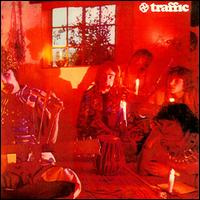 Dear
Mr. Fantasy (1967), ***1/2
Dear
Mr. Fantasy (1967), ***1/2
Keyboardist/guitarist
Steve Winwood had already made a name for himself with his vocals and
songwriting with the Spencer Davis Group, and after
leaving that group he put together Traffic. It is
very obvious these guys and producer Jimmy Miller had been listening
to Sgt. Pepper's a lot, and accordingly they really pull out
all the stops production-wise (mellotrons, phasing, panned vocals -
the works). Guitarist Dave
Mason sounds
high as a kite, and espouses philosophy fitting his state, while
openly aping the Beatles' pleasant acid-fantasies ("House for
Everyone", the obligatory sitar number "Utterly Simple",
and "Hope I Never Find Me There"). As a bonus, he
became one of only a few musicians to make a mellotron sound like
bleating car horns on the first of those songs.
Thankfully, Traffic had their own rock-oriented sound on the rest of
the album, thanks mainly to Winwood. His vocal style is soulful
without being gritty; he sort of shouts at the top of his vocal
range, but without his voice giving way at all ("No Face, No
Name and No Number"). There are a long string of excellent
harder-hitting songs which suit his voice well ("Heaven Is In
Your Mind", the title track, "Coloured Rain").
The lead guitar work (presumably by both Winwood and Mason) is mostly
standard blues work - suitable but not really special. As for
the band's other members (Winwood and Mason split bass duties), Chris
Wood (flute/sax) provides an integral part of their sound without
really being the focus of it (something pretty rare for a woodwind
player) and drummer Jim Capaldi is partially responsible for the
album's hard-hitting nature. Sgt. Peppers' R&B Club
Band? Well, something like that anyway. While parts
of their sound may be derivative, some of this sounds like other
bands' future work - the bluesy flute jam that closes the
album ("Giving to You") could be a proto Jethro
Tull,
and "Utterly Simple" sounds like a major influence on the
Moody Blues. Partially a rip-off, but unique enough and with
strong enough material to merit a good rating.
 Traffic
(1968), ****
Traffic
(1968), ****
Psychedelia's
moment had passed, and Traffic brought out their folk/soul sound
here. Traffic's whole first side is pure gravy, with one
toe-tapping number after another. Mason (who had quit and then
rejoined) had awoken from his daydreams, and turns out to be a very
solid acoustic-based songwriter (the opening "You Can All Join
In", "Cryin to be Heard", "Feelin' Alright").
Winwood's back to his groove/soul thing ("Pearly Queen",
"Who Knows What Tomorrow May Bring"), but there is little
of the excess in which that direction usually results. Traffic
was like a jam band without the jam--they lay down a steady beat, but
never lose the song. Winwood's lead guitar playing is much
crisper this time as well ("No Time to Live"). There
is only one real vocal spotlight song, the down-tempo "No Time
to Live", but it is an excellent one. Traffic
looses some steam on the second side, with a few folky songs that
don't find their way, and are a bit long in the tooth ("Vagabond
Virgin", "Forty Thousand Headmen"). While a
distinct dichotomy existed in writing (this time Mason v.
Winwood/Capaldi), it is a very strong group effort (Mason turns in
some nice organ work on Winwood's "No Time to Live" for
example). There does not seem to be a whole lot for Wood to do;
he's around punctuating the sound at some points, but doesn't get any
writing credits or big moments. Capaldi, in addition to being a
fine drummer, works as Winwood's lyricist. This album sounds
more honest than Mr. Fantasy, and was similarly influential.
While the band sounds like the then-modern English equivalent of an
American barn band (keeping everyone moving), at least at one point
they sound like a proto-Allman brothers ("No Time to Live"
with Winwood's double tracked lead guitar). Produced by Jimmy
Miller again.
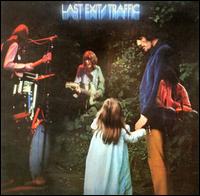 Last
Exit (1969), **
Last
Exit (1969), **
The
band fired Mason and then splintered, with their label releasing Last
Exit in the wake. This is half leftovers, and half Mason-less
live tracks. The leftovers are what are expected: b-sides, unreleased
tracks, etc. Still, the band gave most of these songs their full
effort (only "Something's Got Ahold of My Toe" sounds like
a backing track), just that the results were not good enough to make
their albums. Mason's "Just For You" sounds like it dates
from the band's early Sgt. Pepper-inspired days, while
"Withering Tree" is a moodier Winwood/Capaldi track.
Neither are more than filler. The best tracks are "Shanghai
Noodle Factory" and "Medicated Goo", where the band
concentrated on their strengths: toe-tapping rhythms, soul shouting,
some general grooving, and a strong sense of humor. "Shanghai
Noodle Factory" has a good groove, but needed to be tightened
up. "Medicated Goo" stays focused, boasts a great
sing-along chorus (or soul shout along) and some irrestible hooks.
These two songs are pretty much the only reason to own this album,
and that is not saying much.
The
live side is pretty awful. Without
Mason Traffic sounds empty live, with just organ,
woodwinds and drums. Poor recording does not help matters - Winwood's
organ dominates both the mix and the performance. Giving over most of
your time to a long-winded and rather empty jazz rendition of a
musical song ("Feelin' Good") is not a great choice either.
"Blind Man" is much the same, although shorter, and
combined these two tracks make a whole side of what the industry
perhaps marketed as "live fun!". It is dismal to sit
through, however. Both show how much the band needed Mason, which may
be a reason Winwood called it quits only a few months after Traffic
shrunk to a three-piece. Produced by Jimmy Miller.
During
1969, Winwood took part in Blind
Faith after breaking
up Traffic.
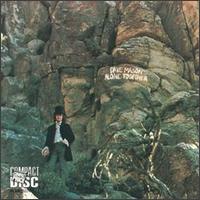 Dave
Mason: Alone Together (1970), ***1/2
Dave
Mason: Alone Together (1970), ***1/2
Mason
went solo in '69, and became part of the whole Delaney & Bonnie
thing, which was part of a movement towards more American
country/folk influences. Similar changes were seen in the Stones
rejection of psychedelia, and more directly Clapton's post Cream
career, as well as later Beatles stuff and George Harrison's solo
work. After playing with D&B, various members of the circle
(Leon Russell, Jim Keltner,
etc.) backed him on the recording of his debut album.
As for the album itself (always the most important part), Mason's
romantic lyrics and reliance on acoustic guitar place him in
soft/folk rock for most the most part (think CS&N), but
unsurprisingly he does
come up with a few Traffic-like numbers as well. Alone
Together's first song is his signature tune, "Only You Know
and I Know", which has a good beat, and some nice electric
guitar lines (Mason? I'd assume so). When he slows down the
album drags, and his lyrical deficiencies become more apparent
("Shouldn't Have Took More Than You Gave" or "Sad and
Deep as You"). Some of Winwood's soul-ness seems to have
worn off on him as well, heard on "Waitin' on You" and
"Just a Song". The last song ("Look At You Look
At Me", co-written with Capaldi) sounds like a sax-less
Traffic. Overall Alone
Together is pleasant early soft rock, with some "harder"
numbers thrown in to keep it interesting. Produced by Mason and
Tommy Li Puma.
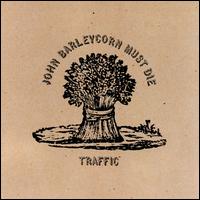 John
Barleycorn Must Die (1970), ****
John
Barleycorn Must Die (1970), ****
Begun
as a Winwood solo project, this album differs in several ways from
its predecessors. Let's take a bottom-up approach to this.
At Traffic's base is the rhythm section of Capaldi and Winwood, which
lays down one of the most solid beats around. I would argue
that Winwood was actually a better bassist than a guitarist in the
studio, but this work is not brought to the fore as often. On
top of that are Winwood's keyboards, which are the solid center of
the music. It is interesting to note that with Mason out of the
picture (at least for this album) the entire first side of John
Barleycorn has no guitar on it. But this opens up space for
more keyboards or guitar from
Winwood, or Wood's shorter horn/flute lines, restoring him (at
least sonically) to full status. Then, around that level, or a
bit higher, are Winwood's usual top-notch vocals (sometimes assisted
by Capaldi). Winwood does do one track almost solo
(Capaldi co-sings), "Stranger to Himself" which is more of
a traditional soul piece, but still good. All of this brings us
to an important point - what it was they were playing. Traffic
added in more jazz and folk sounds here, but not to the point where
it overpowers the music (the fabulous instrumental "Glad"
is the most overtly jazzy). Some of Blind Faith seems to have
stayed with Winwood - like jams
the songs have strong beats and longer running times, but they
also have well-defined structures and don't really stray off into
solo land (with one big exception - "Every Mother's Son"
which features a tepid organ solo in the middle of its seven+ minute
bulk). The excellent title track--a traditional English
folk song built around a relatively simple acoustic guitar tune and
vocal harmonies--is the big
exception . Otherwise, there is plenty of keyboard based
music with a great beat ("Glad", "Freedom Rider",
"Empty Pages"). A classic, with only one dud ("Every
Mother's Son"). Produced by Chris Blackwell and Winwood,
with Guy Stevens doing a couple of lesser tracks.
Now
that the review is out of the way, here is something interesting this
album brings up. On "Empty Pages" it sounds like in
the back center of the mix one can hear what sounds like Winwood's
initial guiding track on electric piano for the song. This
brings up a couple of questions - 1) How often to groups leave the
backing tracks in the final product?, and 2) With Winwood doing so
much on this album, in what order did he lay down the tracks for each
song? In terms of the first question - I would say not very
often. There is one ELP song where it sounds like Lake never
bothered to put in a real guitar solo, and I remember reading about
some Dave Davies track where he did the same. Of course, that's
not counting cases where the group ran out of time or money to re-do
tracks - like the infamous "cello, cello, cello" vocals on
the Who's "A Quick One" which were meant to be replaced by
cellos, or the Yardbirds' Little Games which suffers from
half-assed production almost all the way through. Verdict:
Probably not very often. For the second question, from a purely
speculative standpoint I'd say Winwood laid down an initial rhythm
keyboard track first, maybe with Capaldi drumming, and then bass
(also maybe with Capaldi drumming) and then real keyboard parts,
instruments that solo (i.e. guitar) and then vocals. But what
the hell do I know.
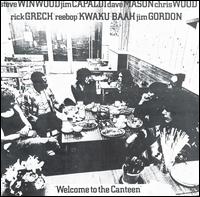 Welcome
to the Canteen (1971), **1/2
Welcome
to the Canteen (1971), **1/2
For
complicated reasons, this album was culled from a brief series of
live dates in mid 1971. This is Traffic's
dream team lineup - Mason joined them for a brief period,
Winwood, Wood, Capaldi, plus bassist Ric Grech, drummer Jim Gordon,
and percussionist Reebop Kwaku Baah. The first side focuses on
Mason, and opens with a fun version of Last Exit's "Medicated
Goo". Half of the side is given over to two of Mason's
solo tracks from Alone Together - "Sad and Deep as You"
and "Shouldn't Have Took More Than You Gave," where he
brings out some good wah-wah leads effectively.
The former sounds as if it would have fit in perfectly with John
Barleycorn - a sparse melancholy folk song that Wood's flute
embellishes wonderfully. The band doesn't sound
under-rehearsed, but whenever the band decides to loosen things up,
nobody steps forward (there's an odd gap at the end of "40,000
Headmen" where the band is just coasting, until Mason brings the
song to a close). This is especially a problem on the back
side, which is given over to long versions of "Dear Mr. Fantasy"
and Winwood's old Spencer Davis tune "Gimme Some Lovin'".
This performance of "Dear Mr. Fantasy" is provides a direct
comparison between Winwood's and Mason's guitar styles--Mason
is rather precise, with comfortable, sharp blues lines, while Winwood
is more emotion than technique--but not much else.
"Gimme Some Lovin'" was a hit because of Winwood's gutsy
soul vocals domineering organ parts and punchy beat. The attempting
to convert it to a jam on this album undermines that, and is met with
little enthusiasm from both the band and the audience, and it never
takes off. Overall, the album's sound is tolerable, with the
vocals fading in and out periodically, and a Union Standard three
percussionists (Gordon, Capaldi and Kwaku Baah), but it is a nice
suggestion of what might have been if Mason stayed with them.
Produced by Winwood and Island Records head Chris Blackwell.
Interesting
side note: The album doesn't say Traffic anywhere, instead being
credited to the musicians. How often does that happen?
Yet, the Traffic emblem is clearly visible on the back cover.
Off the top of my head, I can only think of this happening one other
time - when Yes split into warring factions in the 1980s.
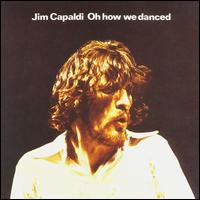 Jim
Capaldi: Oh How We Danced (1971), **1/2
Jim
Capaldi: Oh How We Danced (1971), **1/2
It's
always good to have standards. For example, there is an official
measure of a kilogram (in the form of a metal cylinder) kept by the
International Bureau of Weights and Measures in France. If you need a
definition of average for records, this album probably fills the
bill. Jim Capaldi was a capable lyricist, usually in the anguish and
love arenas, and had been a decent drummer before quitting that role
in Traffic, but here we meet somebody new - Jim Capaldi the crooner.
He's not a crooner in that he's doing old Sinatra standards, but for
the more practical reason that his voice, while warm and friendly
when used gently, does not really hold up under excitement or stress
("Anniversary Song"). That's pretty much all Capaldi is
doing on this album. Granted, his material is for the most part
self-penned (Mason gets one co-write), but none of it is
overwhelmingly good. I don't think it would take much to do what he
did, write a bunch of OK songs, then go down to Muscle Shoals and
hire the studio musicians to play your songs, or rope your friends
into backing you. Certainly there are a pair of genuinely good tracks
(the friendly soul of "Evie", and the clap-along "Open
Your Heart" which is essentially a Traffic recording) and a nice
R&B/blues feel to the music ("Love is All You Can Try",
"Don't Be a Hero", but most of it doesn't rise above the OK
level ('Last Day of Dawn" might be about a congenital heart
defect, for one). Capaldi's material could have been elevated with
some nice playing, but aside from a few throw-away solos by Mason or
Free guitarist Kossoff, it's just one big rhythm section. At least
there a couple of B-grade stars that make an appearance - ex-Move
bassist Trevor
Burton and Spooky Tooth drummer Mike Kellie for one track. More than
a vanity album, but nothing essential or particularly interesting.
Produced by Capaldi and Chris Blackwell.
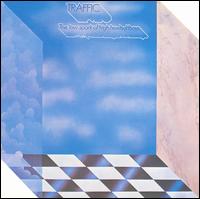 The
Low Spark of High Heeled Boys (1971), ***
The
Low Spark of High Heeled Boys (1971), ***
It
is fairly remarkable that Traffic added so many musicians (bassist,
drummer, congas) without fundamentally changing or improving their
sound from the overdub days. In fact, the only result is that
Capaldi seems to be without a steady job (he's credited as
vocals/drums/keyboards). On Low Spark, Traffic settled
down into mellow folky/jazzy pattern, but it becomes a battle between
inspiration and lethargy on the longer tracks. The title track
has a good amount of verve and a nice groove, but after that the
lethargy begins to win ("Many a Mile to Freedom" is about
at equipoise, but Wood's showcase "Rainmaker" drags for the
most part). There is a nice stab at continuing the folk feel of
John Barleycorn with "Hidden Treasures", and a pair
of funkier songs (Capaldi's "Light Up or Leave Me Alone"
which he sings fairly well and the pedestrian "Rock and Roll
Stew" by Grech and Gordon). Nothing overly essential here,
although you can make a good case for the title track. The
album made was in the US Top Ten but flopped in the UK.
Produced by Winwood.
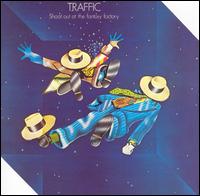 Shoot
Out at the Fantasy Factory (1973), **
Shoot
Out at the Fantasy Factory (1973), **
This
may be bad judgment on my part, but I kind of like this album.
Not that the music is really any good; continuing in the vein of Low
Spark, Traffic is just grooving, making the same sort of low-key
vamp throughout the record. Whereas Low Spark featured
plenty of obnoxious long-winded soloing, here they abstain for the
most part, which brings me to the simple, overriding fact that I love
Winwood's production on this album. It is gorgeous. Apart
from the vocals he focused on the absconded Muscle Shoals rhythm
section of Hawkins and Hood, pushing the soloing back. In fact,
most everything about this album is laid back, hence the low-key
groove feel. Sure, there are plenty of things wrong with this
album - Wood seems to have lost it, contributing sax wriggles or that
old wah-wah stuff again ("Tragic Magic" which isn't that
bad), and they take a good idea and then flog it beyond the grave
("Roll Right Stones" which is perfectly fine until you
realize it is interminably long). On the plus side, Winwood has
toned down the electric guitar for the old piano/organ duotheism, and
with this production I can actually determine Rebop Kwaku Baah's
contributions to the band. The title track is an attempt to be
a more uptempo, shorter equivalent of Low Spark's title track,
but admittedly is not nearly as good. "(Sometimes I Feel
So) Uninspired" might seem like a prime candidate for a quick
joke, but it's a decent stately song, as is it's folkish counterpart
"Evening Blue". Overall this album is a combination
of good production, vacant or pedestrian soloing, occasional
obsessive-compulsive attacks causing excess repetition, and a bunch
of decent musical ideas. Note that I said "kind of like"
- it's not a good album generally, and you may hate it, but it does
make good background music.
On
the Road (1973)
Double-LP
live album. No comment.
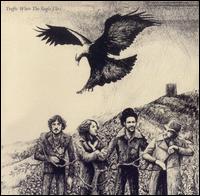 When
the Eagle Flies (1974), **1/2
When
the Eagle Flies (1974), **1/2
Give
Steve Winwood some credit for this album, because he and the rest of
the gang over at Steadily Dwindling Grooves, Inc. really tried.
Sure, there are the usual Winwood-Capaldi songs with big old Traffic
hooks, but they have some sorely needed life in them ("Something
New", "Walking in the Wind" which was a single).
The band shows a great deal of restraint as well, and the aimless
soloing is really kept to a minimum. But Winwood is really
pushing the band in a different direction here, after letting them
ramble on without any direction for the past two albums.
There's even less guitar, and instead (only being a few years
behind the times) Winwood runs out and picks up both a mellotron and
a synthesizer. Welcome to 1974, everyone. So where a long
track like "Dream Gerrard" might have once been a endless
soul vamp, thanks to Viv Stanshell's nutty lyrics, a reasonably
catchy riff for sax and bass, and some gratuitous mellotron usage, it
now trends far more towards palatable progressive rock. Even in
it's last days Traffic was not really a progressive band - they're
far more about the jazzy groove than any flamboyant playing or fancy
riffs. Winwood was making an effort to update their sound,
although it is by copying others-- his electric piano work lies
somewhere between Canterbury and Middleton
(try the intro to
"Graveyard People"), and what could be more trendy than
some truly disgusting synth tones ("Graveyard People",
"Walking in the Wind" with strange clicking noises as
well)? While there is not any meandering soloing, there isn't
much in its stead, with Wood making about as much impact as Winwood's
guitar playing (i.e. very little). The result is that when the
band gets a good sound going it doesn't really go anywhere, but it
sounds a whole lot better than their past few albums. There is
still a whole pile of filler ("Love", title track, parts of
every track), but "Something New" pretty much embodies the
album. It may be a breakup song, but it is fairly happy in tone
and represents a step in the right direction, which is what this
album was. Even if it was their last step.
No,
a soul vamp is not some sort of horror movie character.
Done
staring at empty pages? Back to the Music Page then...
 Dear
Mr. Fantasy (1967), ***1/2
Dear
Mr. Fantasy (1967), ***1/2
 Traffic
(1968), ****
Traffic
(1968), ****
 Last
Exit (1969), **
Last
Exit (1969), ** Dave
Mason: Alone Together (1970), ***1/2
Dave
Mason: Alone Together (1970), ***1/2  John
Barleycorn Must Die (1970), ****
John
Barleycorn Must Die (1970), **** Welcome
to the Canteen (1971), **1/2
Welcome
to the Canteen (1971), **1/2 Jim
Capaldi: Oh How We Danced (1971), **1/2
Jim
Capaldi: Oh How We Danced (1971), **1/2 The
Low Spark of High Heeled Boys (1971),
The
Low Spark of High Heeled Boys (1971),  Shoot
Out at the Fantasy Factory (1973), **
Shoot
Out at the Fantasy Factory (1973), ** When
the Eagle Flies (1974), **1/2
When
the Eagle Flies (1974), **1/2